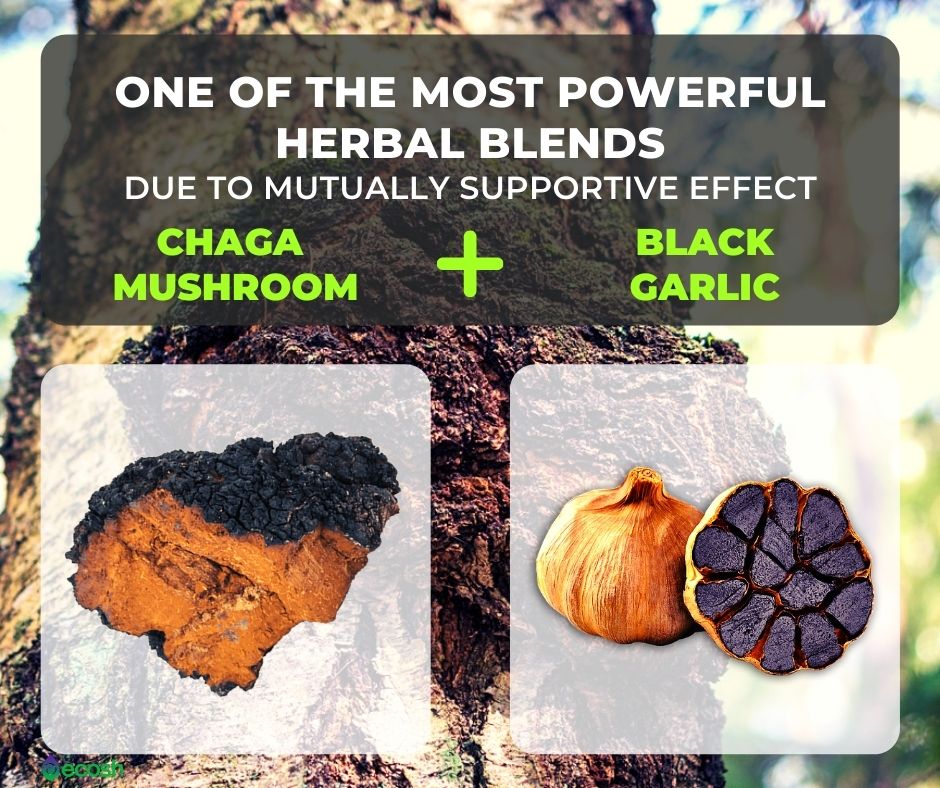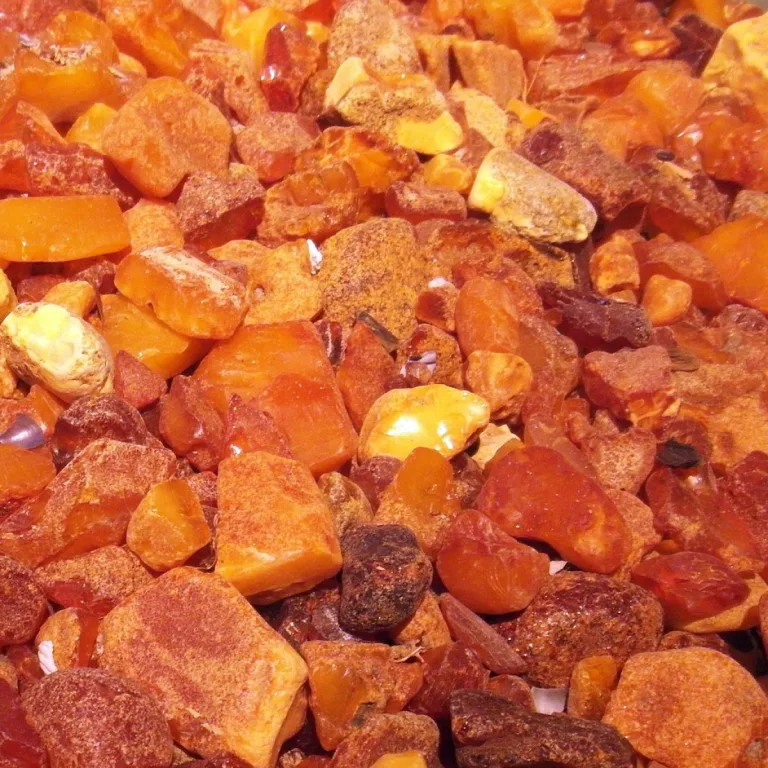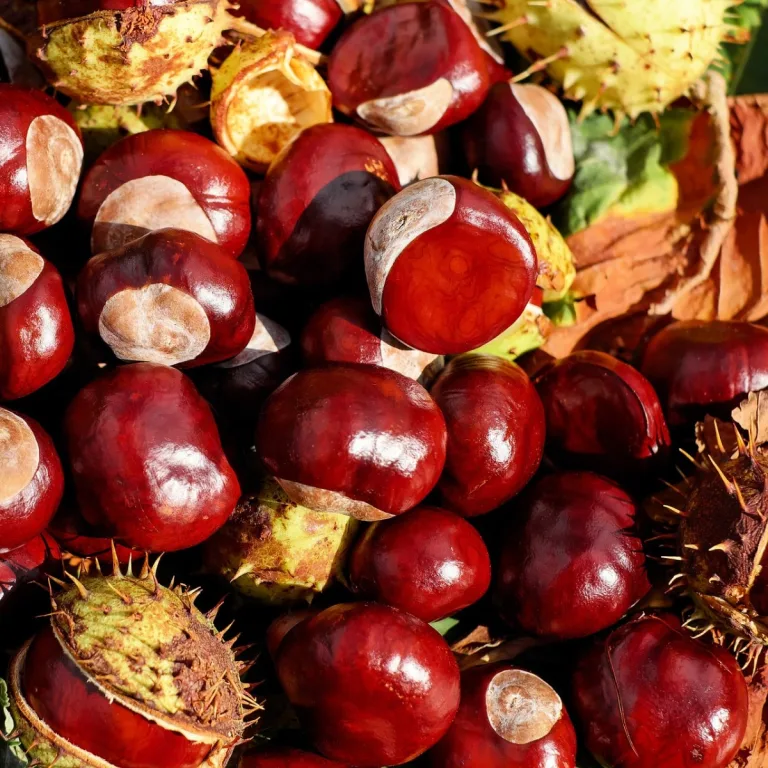Black garlic (Allium nigrum) has been used to increase vitality and boost the immune system for centuries and is now more important to our well-being than ever before. Like its cousin onion, garlic is versatile and plays many different wide-ranging roles in protecting human health. To be honest, garlic has so many health benefits that it deserves a book dedicated only to itself.
Garlic is an antiviral, antibacterial, antifungal (including mold), and antiparasitic agent that is also rich in allicin, a sulfur-containing active ingredient that prevents diseases.
Although black garlic contains less allicin than fresh raw garlic cloves, it still stands out for its high concentration of many nutrients, antioxidants, and other beneficial compounds. These higher concentrations may be responsible, at least in part, for many of the healing effects of garlic.
Here, in this article we discuss thoroughly about all the nutrients contained in black garlic, the health benefits of black garlic, in which conditions this miracle herbal remedy may support your health, and why it is useful to combine black garlic with chaga mushroom.
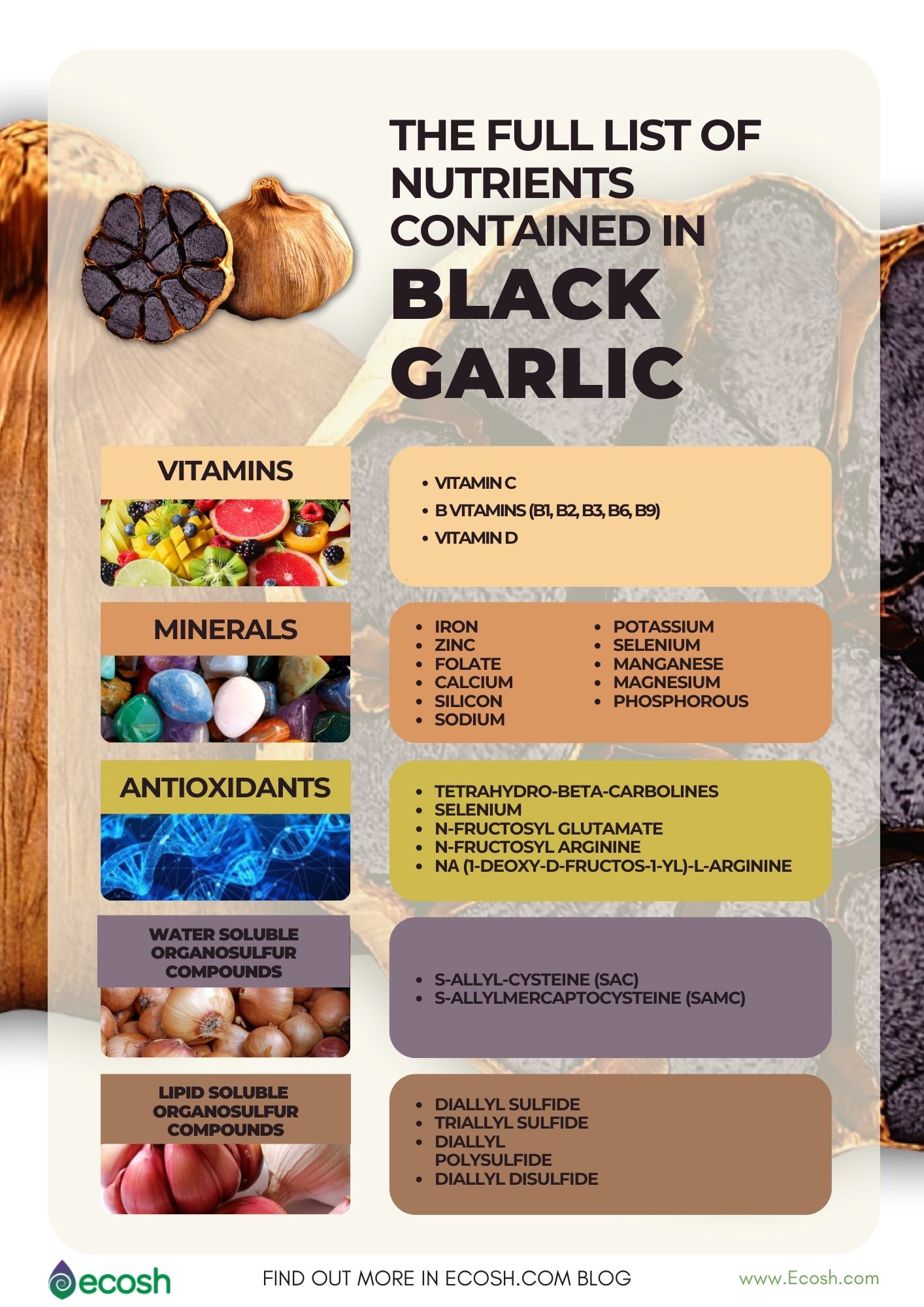
Black Garlic is Extremely Rich in Nutrients
Some people call garlic a “Natural Antibiotic”. And not in vain – garlic contains more than 200 chemical compounds with a variety of beneficial health properties. Although black garlic has the lowest moisture content than raw garlic, it has the highest total amount of sugars and energetic value.
For example, among many other substances, black garlic also contains sodium, potassium, selenium, calcium, magnesium, silicon, zinc, iron, sulfuric acid, phosphoric acid, B-vitamins (B1, B2, B3, B6, B9,), vitamin C and D.
Though, black garlic contains less of allicin (this compound gives raw garlic some of its health benefits) than regular garlic, it’s still rich in antioxidants (almost double the amount than in regular garlic), amino acids, and phytonutrients. However, the fermentation process may change the concentrations.
Black garlic also contains more of S-Allylcysteine (SAC), which helps your body to absorb allicin. Therefore, black garlic may be more efficient at helping your body get the benefits that allicin offers (32, 42).
Black garlic supplements are available here.
The Full List of Vitamins, Minerals and Other Active Compounds in Black Garlic
- Vitamins in black garlic:
- Vitamin C
- B Vitamins (B1, B2, B3, B6, B9)
- Vitamin D
- Minerals in black garlic:
- Antioxidants in black garlic. Black garlic packs at least double the antioxidants compared to fresh garlic.
- Polyphenols (allixin). These micronutrients are loaded with antioxidants and the polyphenol level in black garlic is at least twice that of the level contained in raw garlic. Polyphenols are associated with diabetes management, weight loss, and so much more (36, 37).
- Tetrahydro-beta-carbolines
- Selenium
- N-fructosyl glutamate
- N-fructosyl arginine
- Nα (1-deoxy-D-fructos-1-yl)-L-arginine
- Organosulfur compounds in black garlic (water soluble). These two compounds have been demonstrated to be the most significant active components in black garlic that possess major health benefits. The more SAC black garlic contains the better, but the minimum concentration 1 mg has been shown to have the above benefits in lab animals. In addition, Allyl-cysteine contained in black garlic has been studied as a possible cholesterol lowering agent, and as an cancer preventive agent (38, 39, 40).
- S-Allyl-Cysteine (SAC)
- S-Allylmercaptocysteine (SAMC)
- Organosulfur compounds in black garlic (lipid soluble):
Natural black garlic supplements with the second nature’s miracle remedy chaga mushroom are available to purchase online.
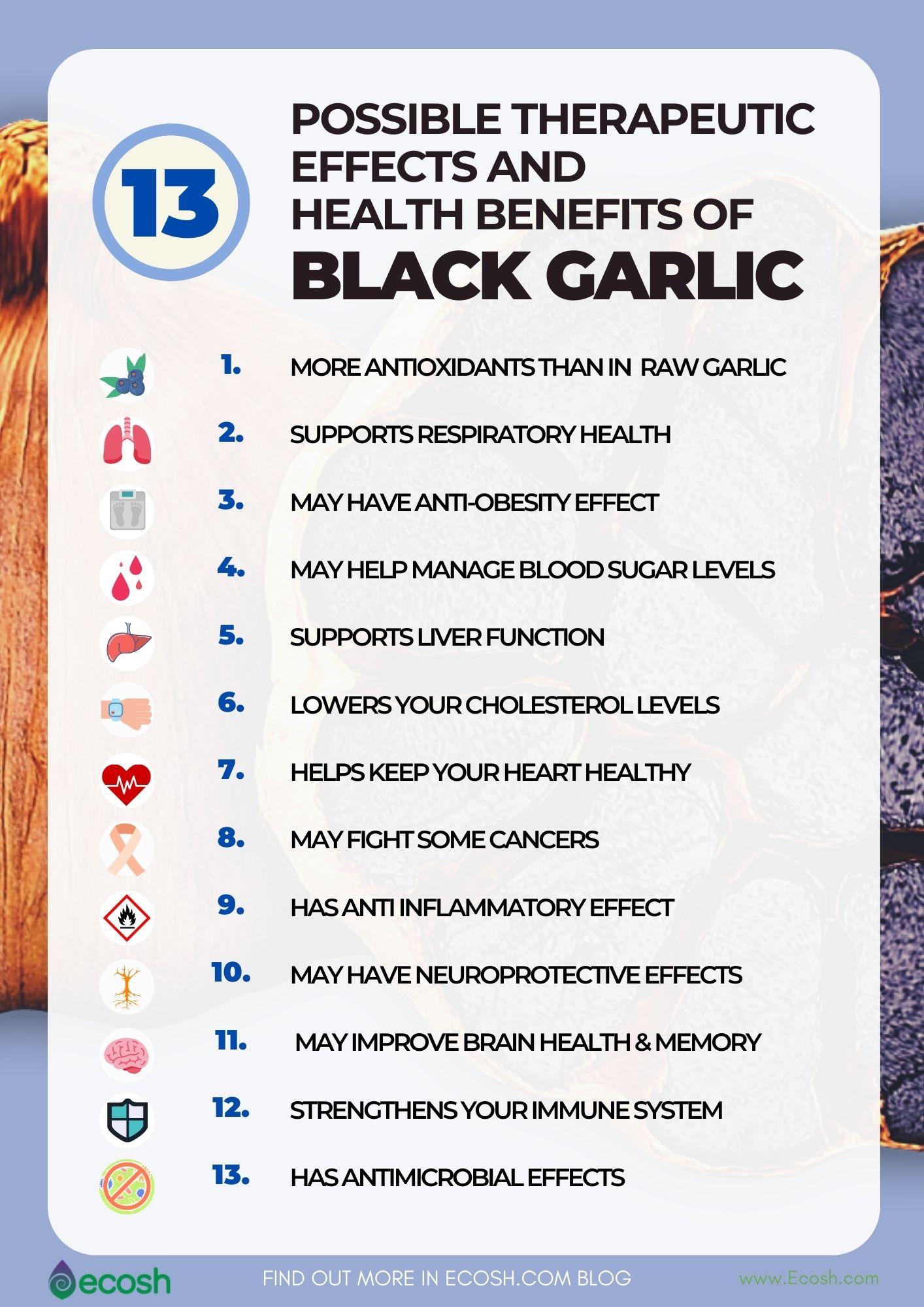
13 Therapeutic Effects and Health Benefits of Black Garlic
Although black garlic contains less of the active compound allicin than raw garlic, it does pack higher amounts of numerous other nutrients, antioxidants, and other beneficial substances. Therefore, this miracle herb has plenty of benefits on your health.
1. Antioxidants in Black Garlic – Black Garlic Contains More Antioxidants Than Raw Garlic
Antioxidants are beneficial substances that neutralize, suppress and control the development of free radicals. In your body, there has to be a balance between antioxidants and free radicals. When the balance is ruined, free radicals become dangerous and start to damage your cells (oxidative stress).
But antioxidants disrupt these harmful chain reactions initiated by free radicals. The most important antioxidants are vitamins C, A, E, carotenoids, flavonoids, ubiquinones, selenium, manganese and zinc.
Where Do You Get Antioxidants?
- From food. Noteworthy is that antioxidants mutually strengthen each other, so it is important that your body gets the whole set of antioxidants at the same time. See the full list of top antioxidant rich foods here.
- Your body produces some of the antioxidants itself (for example, coenzyme Q10, melatonin, lipoic acid).
Our body has developed three antioxidant enzymes that protect us 24 hours a day throughout our lifetime. However, these do not offer sufficient protection from free radicals in case you have an unhealthy lifestyle and unbalanced diet.
Antioxidants, for example, may slow down the aging process, lower cholesterol levels, reduce the risk of atherosclerosis, reduce the risk of heart disease and stroke, slow down Alzheimer’s disease, lessen the risk of tumors, decrease the harm caused by cigarette smoke, and so on. And as said before, black garlic and chaga contain a massive amount of antioxidants.
2. Black Garlic Supports Respiratory Health
Like fresh garlic, black garlic also contains allicin (though in smaller amounts) which possess antioxidant effects that help in fighting throat infections and lessening the severity of upper respiratory tract infections (34).
3. Black Garlic May Have Anti-obesity Effect
Animal studies have shown that black garlic extract could increase the anti-obesity and cholesterol-lowering effect of exercise, as the combination of exercise and black garlic demonstrated a considerable effect on decreasing epididymal fat, visceral fat, and liver weight (35).
4. Black Garlic and Blood Sugar – Black Garlic May Help Manage Blood Sugar Levels
Similarly, to raw garlic, due to the high number of polyphenols – black garlic may also help to manage blood sugar levels and therefore prevent complications related to diabetes (36). Lessening your blood sugar levels may help prevent severe health conditions, such as symptoms of diabetes, kidney problems, and many more.
5. Black Garlic and Liver Health – Black Garlic Supports Liver Function (Hepato-protective Effect)
Your liver is an extremely vital organ which exerts protein biosynthesis, detoxicate and digestive biochemical production. However, your liver is at risk with alcohol, solvents, medications, chemicals, infection, and nutritional supplement.
Luckily, black garlic may help better your liver health, as it has shown to protect the liver from harmful side effects including apoptosis and hepatotoxicity of anticancer medicines (cyclophosphamide). Studies indicate that black garlic supplement at the dose 200mg/kg body weight recovers the DNA damage, histological change, and blood biochemical parameter alteration (aspartate transaminase, bilirubin, alanine transaminase) as well as rises the hepatic antioxidant enzyme levels.
Therefore, black garlic can aid to lessen markers of liver injury following liver damage, rebalance liver cell size, and lower fatty deposits in the liver (32, 35).
6. Black Garlic and Dyslipidemia – Black Garlic Lowers Your Cholesterol Levels
Similarly, to fresh garlic, black garlic can also help lower your cholesterol levels and triglyceride levels (35, 38, 39).
7. Black Garlic and Heart Health – Black Garlic Helps Keep Your Heart Healthy
It is a known fact that fresh raw garlic has the ability to help improve heart health. But now we know that black garlic may possess the same protective and beneficial actions due to the positive effect on your cholesterol levels.
Numerous studies support the long-term belief that garlic can improve circulatory and heart health by lowering blood cholesterol levels (lowering low-density lipoprotein or bad cholesterol (LDL) levels in the blood, thereby increasing circulating good cholesterol (HDL)), and acting as an antioxidant to protect blood vessels from free radical attacks.
As cholesterol in the blood vessels decreases, the blood flow to the capillaries increases, and this in turn reduces the blood pressure and excessive blood clotting. Garlic also has the ability to remove toxic heavy metals from the colon. In addition, black garlic acts as a blood thinner, and thereby reduces the risk of stroke and heart attack (1).
8. Black garlic and Cancer – Black Garlic May Fight Some Cancers
Several studies demonstrate that the antioxidant effects of black garlic block free radicals in your body and may therefore help to combat against cancer. It’s because blocking free radicals reduces cell damage and may help to restrict the growth and possible spread of harmful cancer cells in the body (33, 35, 40).
9. Black Garlic and Inflammation – Black Garlic Has Anti Inflammatory Effect
Like its cousin fresh raw garlic, also black garlic can reduce inflammation. Moreover, the results of a study suggest that black garlic extract is an even more promising medicinal agent to prevent or cure inflammation-related diseases than raw garlic extract (35, 41).
10. Black Garlic and Its Neuroprotective Effects
Through its anti-amnesic effect, improvement of cognitive impairment, and prevention from neurotoxicity and neuroinflammation, black garlic may also have beneficial effects to your nerve system (35).
11. Black Garlic and Brain Health
Again, due to the high number of antioxidants, and inflammation reducing properties, black garlic may improve memory, and help prevent cognitive conditions such as Parkinson’s disease and Alzheimer’s disease (32, 35).
12. Black Garlic and Immune System – Black Garlic is Antiviral and Strengthens Your Immune System
The antioxidants in black garlic also help improve your immune system and support your body in fighting infections and bacteria more effectively (1, 32, 35).
13. Black Garlic Has Antimicrobial Effects and it Helps Protect Your Body from Harmful Microorganisms, Microbiological Imbalance and Fungi
Although black garlic has the lowest moisture content than raw garlic, it has the highest total amount of sugars, and energetic value as well as antioxidant and antimicrobial (particularly against methicillin-resistant Staphylococcus aureus) activities.
Therefore, active ingredients present in this miracle herb not only act against microbes, bacteria and fungi, but also protect against various parasites, yeast and viral infections. In addition, black garlic helps maintain the microbiological balance in the gut, and supports your body during stress (1, 42).
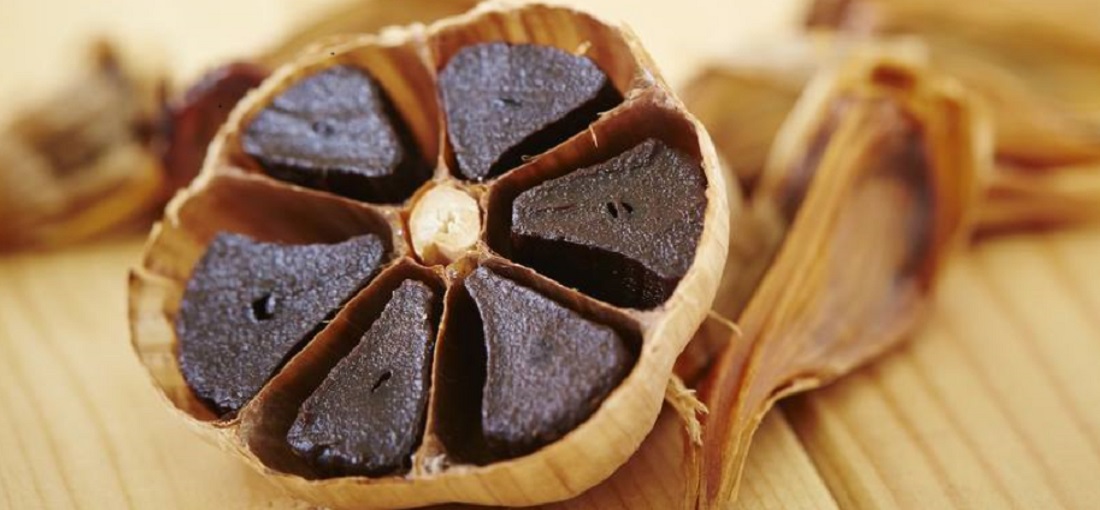
When Should You Eat More Black Garlic and in What Health Conditions Black Garlic May Help?
If you have any of the following symptoms, try to eat more garlic to support your health:
- Swelling of the lymphatic system
- Inflammation
- Facial nerve palsy
- Ear pain
- Postnasal drip syndrome
- Headaches
- Indigestion
- Mouth ulcers
- Enlarged spleen
- All neurological symptoms, including nerve pain, itching, numbness, spasms, twitching, and tightness in the chest
- Appendix infection
- Difficulty breathing
- Back pain
- Bad breath
- Cough
- Chest pain
- Hyperaemia
- Floating in the eyes
- Excessive mucus secretion
- Fever
- Tiredness
- Liver stagnation
- Neck pain
- Nasal pain
- In addition, Candida proliferation
Natural black garlic supplements with the second nature’s miracle remedy chaga mushroom are available to purchase online.
Let’s Also Talk About the Second Nature’s Powerful Herbal Remedy – Chaga Mushroom
Chaga mushroom (Inonotus obliquus in Latin), also called clinker polypore, black mass, birch canker polypore, cinder conk and the sterile conk trunk rot (of birch) is a medicinal fungus in the family Hymenochaetaceae.
Medicinal funguses (mushrooms) are mainly used as dietary supplements in the form of powder or extracts to prevent, alleviate, or to heal diseases and/or for nutritional reasons.
Chaga mushroom grows as a parasitic plant mainly on the bark of birch trees. Besides birch, chaga also likes to grow on alder, beech, common oak and other deciduous trees in Russia, Finland, North America, Eastern Europe and Japan at latitudes of 45 ° N-50 ° N.
The Chaga mushroom, also called “Mushroom of Immortality” is the most nutritious wild mushroom that has been used in folk medicine to treat several disorders. Chaga is another extraordinarily powerful antioxidant that provides you with an impressive dose of antioxidants, SOD enzymes, essential amino acids, minerals and other vital substances.
The cocktail of these extraordinary substances is claimed to boost your immune system, remove free radicals from your body, protect cells, enhance resistance, fight pathogens, lessen inflammation, have antitumor properties, prolong cellular proliferation and extend lifespan.
For instance, in Estonian traditional texts, chaga is known as an anti-cancer herb, and it has been used to improve health for thousands of years. Research on the effects of chaga began a few hundred years ago, but it has been more intensely studied only for the past few decades.
Natural black garlic supplements with the second nature’s miracle remedy chaga mushroom are available to purchase online.
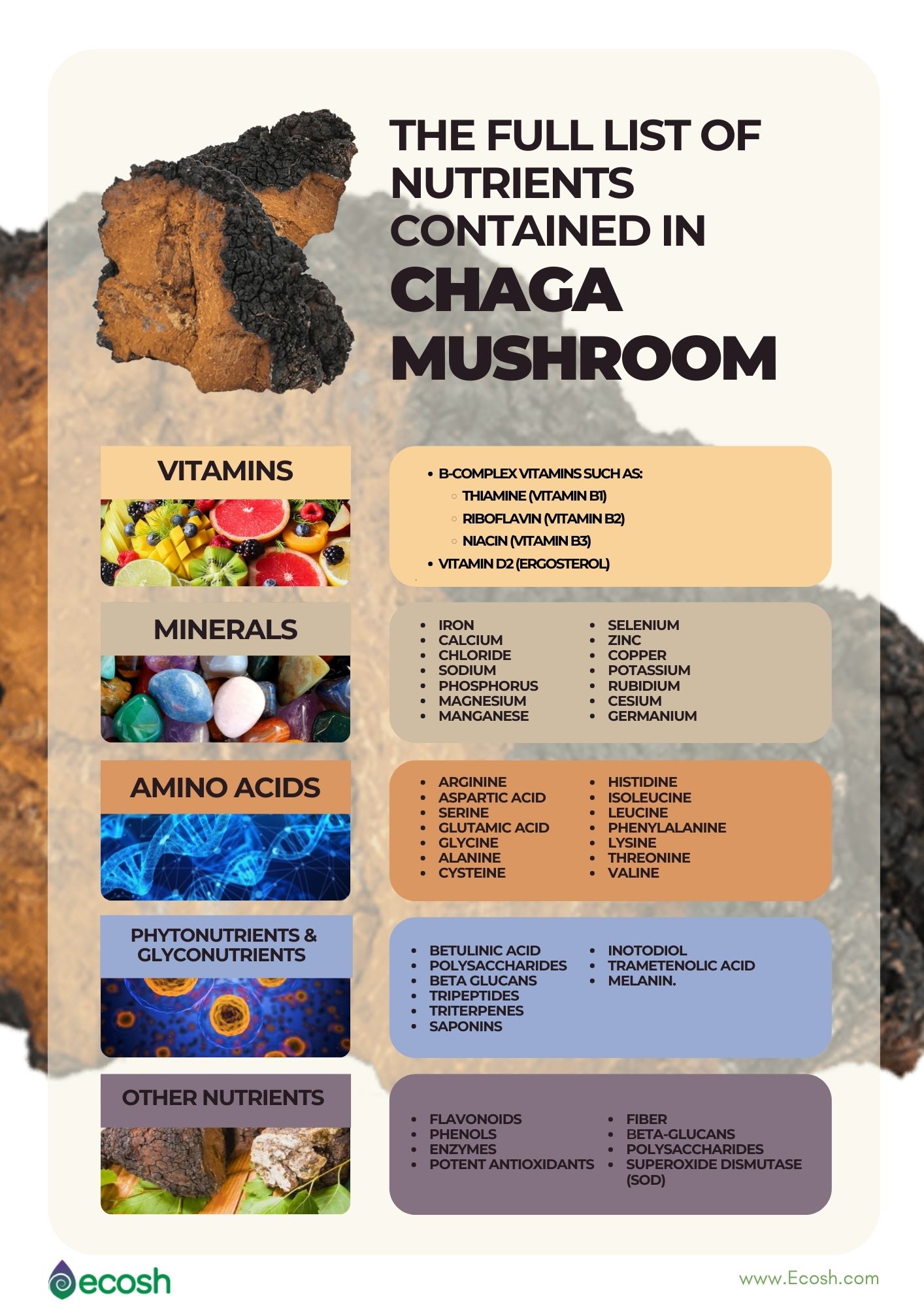
Chaga Mushroom is Extremely Rich in Nutrients – The Full List of Vitamins, Minerals and Other Nutrients Contained in Chaga Mushroom
One of the most important roles of chaga mushroom is to build your immune system (immune system builders are also called adaptogens) – and this is something we all need. Moreover, chaga contains extraordinary amounts of powerful antioxidants, vitamins, as well as proteins, and may increase the activity of cancer killer cells by up to 300%.
Chaga mushroom has also been shown to inhibit bacteria and viruses and have anti-inflammatory effects. In addition, chaga contains various natural adaptogenic substances, beta-glucans, betulinic acid, and 19 of the 20 amino acids humans need.
Chaga mushrooms are rich in a variety of vitamins and minerals, such as B-complex vitamins, vitamin D, potassium, rubidium, cesium, copper, selenium, zinc, iron, manganese, magnesium, calcium, amino acids, and fiber.
Phytochemicals in chaga are excellent cancer fighters, blood glucose regulators, adrenal stimulants, bad cholesterol (LDL) lowerers, and good cholesterol (HDL) elevators, while regulating the whole endocrine system, breaking down and dissolving the film (a gel – like substance that is a by-product of certain viral and fungal activities), and destroying harmful fungi in the gut.
Furthermore, chaga mushrooms also contain large amounts of a highly pure antioxidant called superoxide dismutase (SOD), which is important for liver cleansing. According to research, compounds from chaga do not attack pathogens directly, but instead stimulate your body to fight the infections itself (1, 2, 3, 4, 5, 6, 7, 8).
Naturalblack garlic supplements are available to purchase online.
Here is The Full List of The Nutrients and Active Ingredients in Chaga Mushroom:
-
Vitamins contained in chaga:
- B-complex vitamins such as:
- Thiamine (Vitamin B1)
- Riboflavin (Vitamin B2)
- Niacin (Vitamin B3)
- Vitamin D2 (Ergosterol)
- B-complex vitamins such as:
-
Minerals contained in chaga:
- Iron
- Calcium
- Chloride
- Sodium
- Phosphorus
- Magnesium
- Manganese
- Selenium
- Zinc
- Copper
- Potassium
- Rubidium
- Cesium
- Germanium
-
Amino acids contained in chaga:
- Arginine
- Aspartic acid
- Serine
- Glutamic acid
- Glycine
- Alanine
- Cysteine
- Histidine
- Isoleucine
- Leucine
- Phenylalanine
- Lysine
- Threonine
- Valine
-
Phytonutrients (over 215 phytonutrients) and glyconutrients in chaga strengthen the immune system, serve as antioxidants, elevate cell-to-cell communication, enhance metabolism, repair DNA damage, detoxify and convert vitamin A (beta-carotene is metabolized to vitamin A). These phytonutrients and glyconutrients include nutrients such as for example:
- Betulinic Acid (phytosterol)
- Polysaccharides
- Beta Glucans
- Tripeptides
- Triterpenes including Lanosterol-type Triterpenes and Sterols. Triterpenes cardiovascular and immune system strengthening properties improve the ability to lower cholesterol levels, fight diseases and boost the elimination of foreign abnormal cells.
- Saponins. These substances have been shown to have antioxidant and anti-inflammatory properties.
- Inotodiol
- Trametenolic Acid
- Melanin. Melanin possesses high antioxidant and gene protective effects, so it improves the appearance of hair, skin and eyes, and brings back a more youthful look.
- Flavonoids
- Phenols
- Enzymes
- Potent antioxidants
- Fiber
- ß-glucan polysaccharides (beta-glucans). These substances increase the production of natural killer cells. These cells in your body are in charge of cellular mediated attack against infections and diseases. Beta-glucans also help your body identify cancer cells as foreign.
- Polysaccharides. Polysaccharides deliver other nutrients to where they are needed most in your body to improve bioavailability and sustain optimum health and wellness.
- Superoxide dismutase (SOD). Chaga mushrooms contain the highest amount of SOD found in any natural food. Some other foods like broccoli, wheatgrass, and certain cabbages also contain superoxide dismutase, but in much lower levels (7, 26).
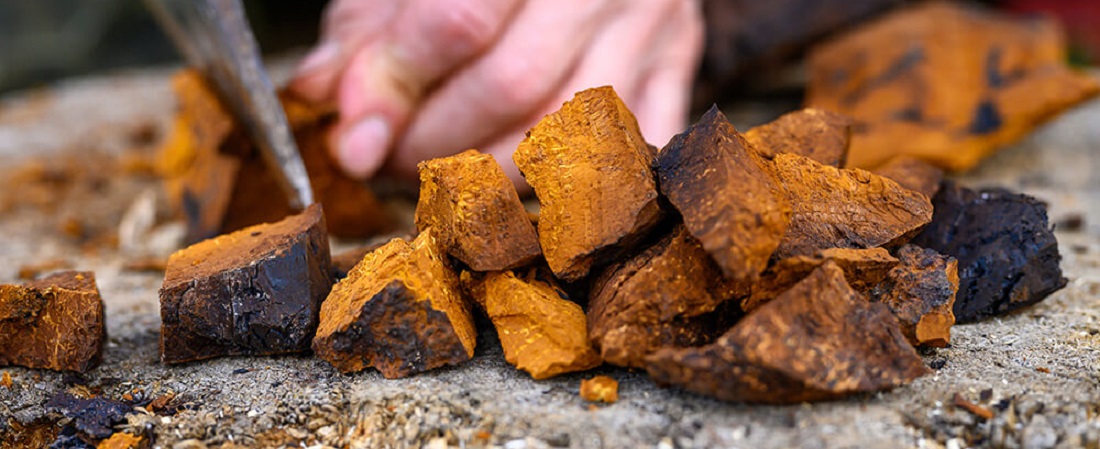
What are Adaptogens?
Adaptogens are natural stimulants that help your body adjust to chemical, biological or physical stress. Although scientists have not fully understood how adaptogens work, they are known to be effective – especially in balancing the hormonal system.
Adaptogenic plants restore your body’s balance, for instance in both cases of thyroid diseases such as hyperthyroidism or hypothyroidism. They also help protect your body from the harmful effects of the environment, improve organ function and keep the body from abnormalities.
In addition, adaptogens stimulate metabolism and allow your body to work in a sustainable and balanced mode (called homeostasis) that helps fight disease.
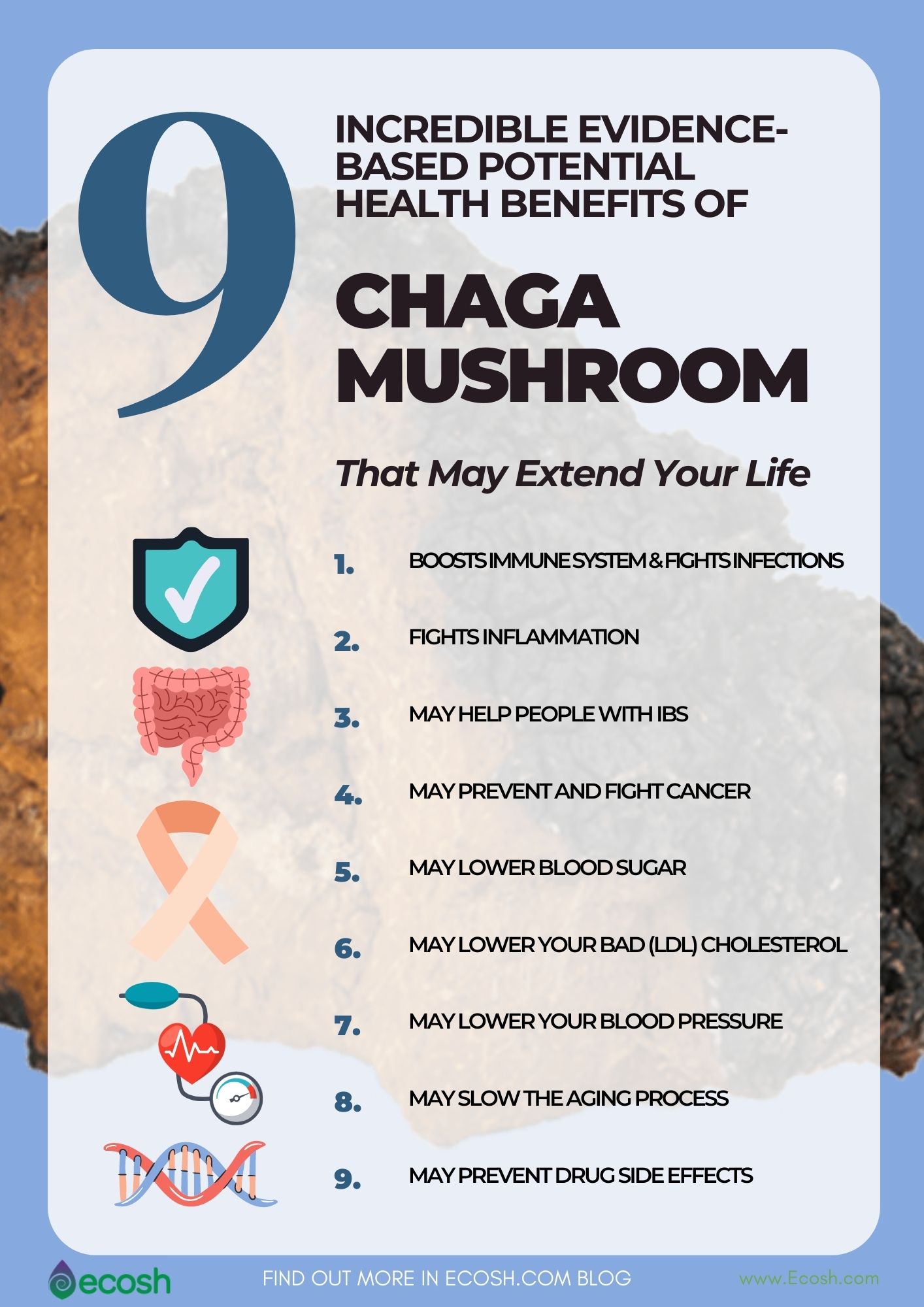
9 Health Benefits of Chaga Mushrooms – For Which Health Conditions Chaga May Help?
Animal and test-tube studies have found that chaga mushrooms may have several health benefits for you. For instance, it may help to boost your immunity, lessen bad cholesterol, prevent long-term inflammation, fight cancer, lower blood sugar levels and have an anti-aging effect. Nevertheless, more human studies are still required to confirm all these statements.
1. Chaga and Immune System – Chaga Mushrooms Improve Your Immunity and Fight Infections
According to some animal and test-tube studies chaga extract can positively influence immunity by promoting the production of beneficial cytokines. These are the immune system’s chemical messengers (proteins that help cells communicate with one another) that play an essential role in stimulating white blood cells. White blood cells are indispensable for fighting off damaging viruses and bacteria (9, 10).
Thereby chaga mushroom could be a great help in combating viruses and infections such as minor colds or severe illnesses.
2. Chaga and Inflammation – Chaga Mushroom Combats Chronic Inflammation
Inflammation is not always a bad thing, as it is a natural response of your immune system that helps fight off infections, promote wound healing and protect against diseases. However, sometimes beneficial short-term inflammation can transit to long-term inflammation – a chronic health problem that is associated with severe conditions (particularly rheumatoid arthritis and heart disease).
Some researchers suggest that inflammation may partly also contribute to depression. Moreover, inflammation is involved in at least 8 of the top 10 leading causes of death in the United States today (11, 14). Luckily, according to some animal and test-tube studies, chaga’s role in regulating cytokine formation may also help control inflammation (12, 13).
This suggests that chaga may have a vital part in healing inflammation caused conditions, autoimmune disorders and possibly also some other diseases.
3. Chaga Mushrooms May Relieve Inflammatory Bowel Disease (IBD)
In one animal study researchers concluded that chaga might be a useful supplement in the setting of inflammatory bowel disease, as it reduced inflammation and gut damage by inhibiting inflammatory cytokines (13).
4. Chaga and Cancer – Chaga Mushrooms May Help Prevent and Treat Cancer
Due to the results of several animal and test-tube studies we have strong reason to believe that chaga may prevent and slow cancer growth. For example, in one study done in mice with cancer, supplementing chaga extract resulted in a 60% reduction in tumor size (15, 16).
Moreover, similar results have been seen with cancer cells of the liver (hepatoma), breast, prostate, lung and colon also in humans (17, 18, 19, 20, 27). What’s noteworthy, is that in contrast to other conventional cancer treatments, chaga mushroom does not seem to damage healthy cells (23).
The anticancer effect of chaga may be partly due to its high amount of antioxidants, which guard cells from oxidative stress which is one of the leading causes of cancer as well as other serious health problems (21).
Guided by these findings the researchers have concluded that continuous intake of the chaga extract may suppress tumor progression and could be used as a natural remedy for cancer suppression and general health care.
However, although researchers are taking seriously the possibility that chaga may have anticancer potential, more human studies are still needed in order to make strong statements (22).
5. Chaga and Blood Sugar – Chaga Mushrooms May Have a Positive Effect on Diabetes
Chaga has been linked also to lower blood sugar levels, so it may therefore help control diabetes. For example, in several animal studies done on diabetic mice or rats – the chaga extract reduced blood sugar levels and insulin resistance compared to those who did not receive the supplement.
In one study chaga led to as much as 31% drop in blood sugar levels over 3 weeks. Moreover, chaga also protected the pancreas from the diabetes induced injuries or restored the damage of pancreas tissue (28, 29, 30, 31, 32).
However, although scientists suggest that chaga might contribute to an alternative treatment for diabetes in the future, human studies are still needed to confirm whether chaga can help manage diabetes also in humans.
6. Chaga Mushrooms and Cholesterol – Chaga May Lower Your Bad (LDL) Cholesterol Levels
According to animal studies, chaga extract may also have a positive impact on cholesterol levels. In addition to the fact that in one study chaga reduced LDL cholesterol levels (bad cholesterol), it also increased HDL cholesterol levels (good cholesterol) while increasing antioxidant levels (24, 25).
Therefore, as high cholesterol levels play a role in developing cardiovascular diseases, chaga may help prevent these types of conditions.
7. Chaga and Lifespan Extension – Chaga Mushrooms May Slow the Aging Process
Oxidative stress due to too many free radicals is one of the biggest culprits that accelerates the aging process of the skin and causes physical signs of aging, such as gray hair, sagging skin, and wrinkles. The causes of the high free radical level in your body that can lead to cell damage and oxidative stress include:
- Eating too much fried, refined and processed foods, trans fats, artificial sweeteners, foods containing carcinogens, and certain dyes and additives
- Excessive exercise
- Smoking
- UV exposure
- Cigarette smoke
- Environmental toxins and pollution
- Radiation
- Exposure to chemicals, such as pesticides and drugs, including chemotherapy, and the consumption of skincare products that contain high amounts of parabens and other chemicals
- Industrial solvents
- Alcohol
- Some medications
- In addition, low levels of antioxidants in food
It’s totally normal to have some free radicals in your body. However, in large quantities, free radicals damage DNA, accelerate aging, and contribute to the development of a variety of diseases. Although scientists have not conclusively associated chaga to anti-aging benefits, its efficacy in combating other types of oxidative stress suggests that it may also fight aging.
So, in theory, giving your body more antioxidants such as chaga may slow the aging process, or even back-pedal visible signs of aging.
8. Chaga Mushrooms and Blood Pressure – Chaga May Have a Positive Effect on Your Blood Pressure
It’s already a known fact that oxidative stress causes fast aging and other damage in your body, but it may also be a contributing factor for high blood pressure. High blood pressure, however, is something you would want to avoid, as it may lead to heart attacks, strokes, and other cardiovascular health problems.
Luckily, due to its antioxidant properties, chaga may also lower your blood pressure and therefore prevent poor cardiovascular health.
9. Chaga Mushrooms May Prevent the Unwanted Side Effects of Drugs
More human studies are still needed, but if this miracle mushroom chaga proves to be efficient at combating diseases such as arthritis and cancer in large-scale studies, it could be the long-awaited alternative to traditional treatments.
That’s because treating people with natural remedies such as chaga mushrooms could prevent them from undergoing the disturbing side effects of other treatments, such as radiation, chemotherapy, and numerous drugs prescribed for chronic illnesses (3, 7).
Symptoms and Signs That Indicate You May Need Chaga Mushroom
If you have any of the following symptoms, chaga mushroom supplements may help to support your health:
- Inflammation
- Shoulder pain and frozen shoulder
- Neck pain
- Back pain
- Headache
- Early fatty liver
- Sluggish liver
- Liver heat
- Iron deficiency
- Joint pain
- Muscle fatigue
- Facial nerve palsy
- Fever
- Rash
- Urticaria
- Pruritus
- Fungal infections in your body and skin (athlete’s foot, nail fungus, jock itch, ringworm, and yeast infections)
- Hyperthyroidism
- Hyperthyroidism
- All neurological symptoms (including numbness, spasms, nerve pain and tightness in the chest)
- Jaw pain and stiffness in the chin
- Stiffness under eyes and floats in front of eyes
- Leg pain
- Arthritis
- Swelling
- Fluid retention
- Neuralgia
- Poor circulation
- Sore throat
Natural chaga supplements are available to purchase online.
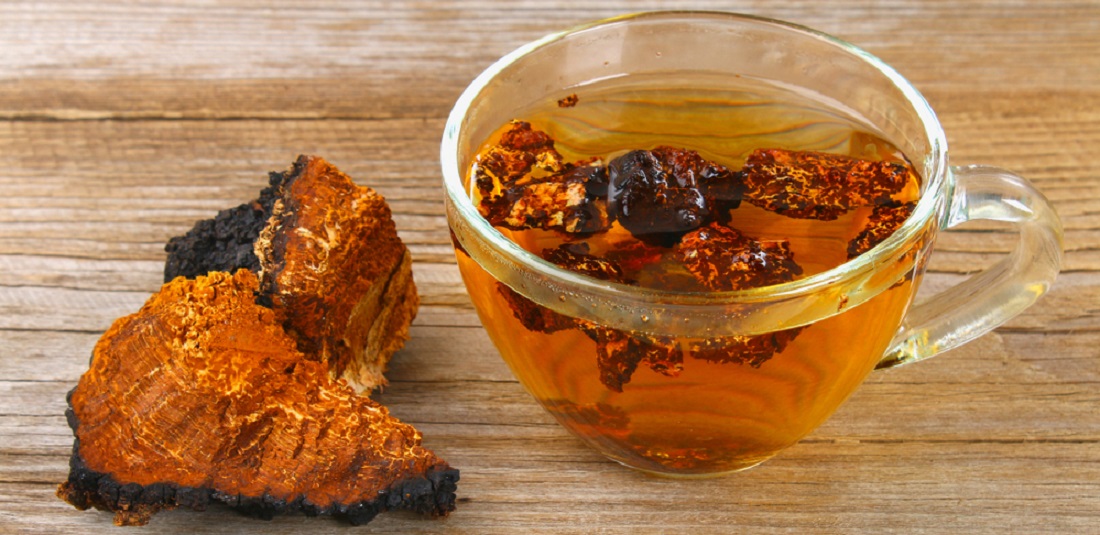
Can Chaga Make You Sleepy or Vice Versa?
Chaga Mushroom does not contain caffeine, but it still helps to maintain a steady energy level. As chaga mushroom has adaptogenic properties, it can therefore help your body adapt to stress and calm you down.
It is good to drink chaga at any time of the day. If you are trying chaga for the first time as a coffee, it is recommended to drink it in the morning or in the afternoon with some vegetable milk, such as for example almond, oat or other pleasant milk. You can also add honey into your chaga coffee.
When Should You Be Careful with Chaga?
- Chaga contains protein, which can prevent the blood from clotting. Therefore, if you are taking blood thinners, have a bleeding disorder or are preparing for surgery, talk to your doctor or therapist before taking chaga supplements.
- As chaga can boost the immune system, people with autoimmune diseases should consult a doctor before taking chaga.
Story Behind the Chaga Mushroom and Black Garlic Supplement – Why Chaga Together with Black Garlic is Marriage Made in Heaven and Why to Take Them in the Form of Capsule?
The short answer to the question why to combine these two, is that the complex of antioxidant enzymes contained in chaga, and black garlic is one of the oldest, safest and most powerful herbal blends, because chaga mushroom and black garlic have a mutually supportive effect.
As a result, your body absorbs the nutrients contained in these nature’s miracle medicines better. Moreover, research shows that the level of antioxidants in black garlic is up to 80 times higher than in raw garlic. So, this is a true love marriage since ancient times, which is genuine as well as beneficial for both parties.
Black Garlic and Chaga by Ecosh:
- Is made from strong and clean plants grown in the wild forests of Estonia – one of the purest natures in the world. Chaga mushroom has been harvested from the mighty forests of Estonia, including the birches of the forests in Saaremaa. Mushrooms – which have grown naturally on trees strengthened by winds and storms for decades, or even centuries – are many times stronger than the chaga cultivated and grown by humans themselves.
- Processing chaga or high temperatures destroy most of the medicinal benefits in this mushroom and render many enzymes like superoxide dismutase. However, in Ecosh Chaga and Black Garlic supplement the chaga is not processed in high temperatures and contains therefore all the healing effects.
- Black garlic added to the product is pure garlic ecologically grown in Estonia. Garlic is cooked for 3 weeks at low temperature and high humidity. In this cooking method the garlic cloves turn black – hence the name black garlic. Thanks to the low temperature, most of the beneficial properties of garlic are maintained. Thus, black garlic is a good alternative for those for whom ordinary garlic is for some reason unacceptable or unsuitable.
Black garlic supplements with Chaga are available here.
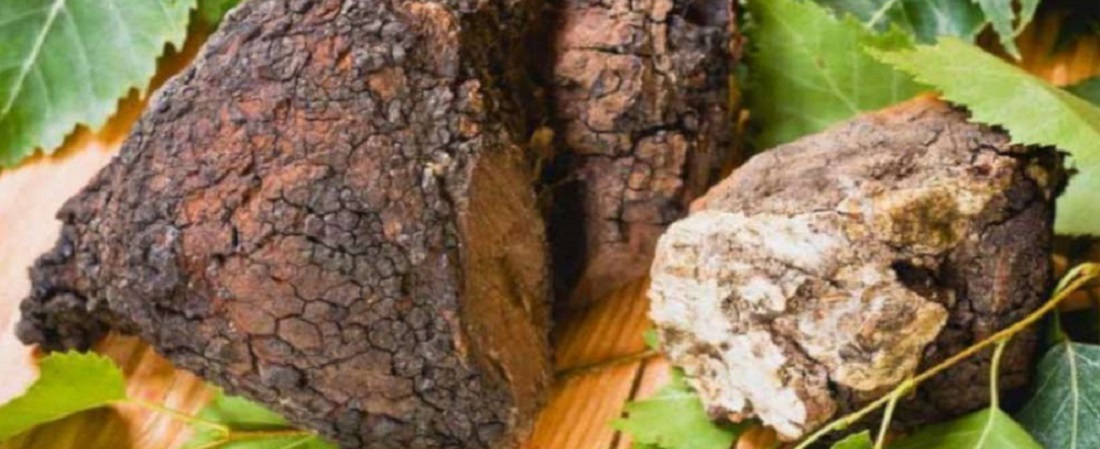
Why Favour Chaga and Black Garlic in Capsule?
- Many people may not like the taste and smell of chaga or garlic, but there is no taste or smell in Ecosh Chaga and Black Garlic supplement in capsule.
- The chaga in the capsules lasts significantly longer than in liquid form.
- This makes chaga in the form of a capsule a more reasonable choice in terms of price and quantity. In other words, capsules are convenient to use, last longer and also the price is more favorable.
How to Use Ecosh Chaga + Black Garlic?
As chaga is an adaptogen, you can use it for a long period of time.
- To maintain your optimal health and wellness – take 2 capsules a day.
- To improve your health – take 2 capsules before meals, 2 times a day.
NB! The information provided here is for informational purposes only, so do not consider it as health care or medical diagnosis and treatment. Do not consider this information as a guarantee of the results you want to achieve. In addition, do not take this information as a replacement for the advice of your physician or other healthcare professional.
Even more, you should not use it to diagnose or treat a health problem. Before changing or discontinuing your existing medication, treatment, or care, or taking any dietary supplements, be sure to consult with your healthcare professional or doctor before starting any diet or program, or if you suspect you may have a medical condition.
Written by Maria-Helena Loik
Pictures: Pexels.com, Pixabay.com, Shutterstock.com
Sources:
- Desk Reference to Nature’s Medicine – Steven Foster; Rebecca L. Johnson
- Medical Medium – Life-Changing Foods
- What Are Chaga Mushrooms
- Health Benefits of Black Garlic
- Black Garlic and Its Therapeutic Benefits
- Antioksüdandid (tlu.ee)
- Chaga: Benefits, tips, risks (medicalnewstoday.com)
- Chaga – National Nutrition Articles
- Immunomodulatory Activity of Chaga (nih.gov)
- Chaga suppress antigen-specific production through the modulation of Th1/Th2 cytokines – PubMed
- Understanding inflammation, its regulation, and relevance (nih.gov)
- Anti-Inflammatory Effects of Chaga
- Chaga ameliorates acute inflammation – PubMed
- Is Depression an Inflammatory Disorder? (nih.gov)
- Antitumor activity of Chaga – PubMed
- Chaga suppresses cancer progression (nih.gov)
- Chaga induces G0/G1 arrest and apoptosis in human hepatoma cells – PubMed
- Anti-inflammatory and anticancer activities of chaga – ScienceDirect
- Chaga induces G1 cell cycle arrest in HT-29 human colon cancer cells – PubMed
- Anticancer activity of subfractions containing pure compounds of Chaga – PubMed
- Chemical constituents from Chaga and their antitumor activities – PubMed
- Chaga Mushroom | Memorial Sloan Kettering Cancer Center
- Anticancer effects of Chaga – PubMed
- Effect of the Chaga Polysaccharides on Blood Lipid Metabolism and Oxidative Stress| IEEE Conference Publication
- Anti-diabetic effects of Chaga polysaccharides – PubMed
- Chagamushrooms.pdf (immune-d.com)
- Chaga, a Future Potential Medicinal Fungus in Oncology?
- Anti-diabetic effects of Chaga – PubMed
- Antihyperglycemic and antilipidperoxidative effects of Chaga – PubMed
- Protective Effect of Polysaccharides from Chaga (nih.gov)
- Hypoglycemic Effects of Chaga (fao.org)
- Black Garlic: Health Benefits, Nutrients, Preparation (webmd.com)
- Radiosensitization effect of black garlic on lung cancer cell line Lewis cells – PubMed
- Eat garlic to keep respiratory diseases at bay | TheHealthSite.com
- Black Garlics Therapeutic Benefits (researchgate.net)
- Polyphenols effects on diabetes management (nih.gov)
- High polyphenol, low probiotic diet for weight loss – ScienceDirect
- Black garlics effects on lipid metabolism (nih.gov)
- Cholesterol-lowering effect of garlic and organosulfur compounds – PubMed
- Garlics Organosulfides as Potential Chemopreventive Agents (eurekaselect.com)
- Anti-inflammatory effects of Black Garlic – PubMed
- Black Garlic: Nutritional Composition and Bioactive Properties (nih.gov)
- Black garlic bioactivity, and application – ScienceDirect

